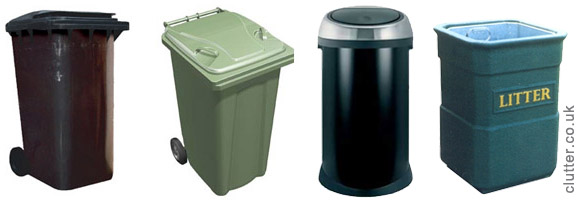You’ve decided that you do have clutter, you realise that it’s harming you and you’ve run out of excuses. You can’t put it off any longer; you’ve finally decided that the time has come to tackle it once and for all. So where do you start?
Pick a High Energy Day
First of all pick a day when you feel reasonably energetic, because if you’re tired before you start then you won’t get very far. You know what it’s like; some days you feel like you can move mountains and other days you feel like you’re buried under a mountain. Make sure you’re in a positive mood, or at least feeling so desperate to change that nothing can stop you!
Don’t Wear Your Sunday Best
Make sure you wear old, comfortable clothes and not your Sunday best, as when you start crawling into cupboards and attic spaces you’re likely to get dusty, hot and cobwebby. If your clutter’s been lying in state for a very long time then you may feel like you need a full biohazard suit for protection!
Don’t Be Disturbed
Choose a day when you know you won’t be disturbed by other people, as nothing is more annoying than constant interruptions. Picture it; you’ve heaved yourself up into your attic and and you’re trying to manipulate a large box down the ladder, so that you can sort through it.
The last thing you want at that moment is for the doorbell to ring or the phone to go. So disconnect the doorbell, take your phone off the hook, put your mobile on silent and warn everyone that you are not to be disturbed.
Decide on Your Goals
Set out some clear but achievable goals for yourself, such as sorting out the cupboard under the stairs, or the wardrobe in your bedroom. If you aim to de-clutter the entire house in one day then you may never get started at all, and even if you do start you’ll be sorely disappointed at how little progress you will appear to make.
Remember it’s taken you years to acquire all this junk; you can’t expect to lose it all in one day. In addition de-cluttering can be quite tiring, so if you overdo it then you can expect some aches and pains the next day.
Tool Up
Gather some materials around you that you’ll find useful; for example dusters, polish, and a packet of baby wipes. This way you can do a quick cleaning job on the clutter you unearth. You will also need one rubbish bag and three boxes, as all clutter should fall into one of four categories: Rubbish, Charity, Use, and Store.
The Rubbish Bag
The Rubbish bag is for anything broken or completely obsolete. Be realistic here. It’s not worth mending obsolete items, and if you’ve had the item for years and not mended it before then you’re unlikely to do so now. Obsolete items are also unlikely to be valuable unless they are rare and in mint condition; if in doubt then do some research on the internet to find out whether your item is of any value.
The Charity Box
The Charity box is for useful items which you don’t want or need yourself. Examples of this are clothes which don’t fit you, hobby gear you don’t use any more, your unwanted garden gnome collection, or excess items of kitchenware.
The Use Box
The Use box is for items which you would use if they weren’t in the wrong place; for example pens that should be on your desk, dvds that should be on a shelf with the others, papers that need filing away, etc. You’ll be amazed at how many ‘missing’ items you unearth in your de-cluttering, and this is part of the fun of doing it.
The Store Box
The Store box is for items you’re keeping for sentimental reasons such as your baby’s first shoes, or occasional-use items such as Christmas decorations, or camping equipment. Store items should be packed into appropriate containers, labelled so that you can find them again, and put into a storage space which is reasonably accessible.
Be careful that you don’t keep too many of these items though. Storage is finite, so keeping things which aren’t going to be used frequently is not something you want to make a habit of.
Action Stations
When you’ve finished your designated area then deal with your boxes immediately. Take your rubbish bag straight out to your bin (if it’s collection day soon then all the better). Put the charity box into your car and drive it straight to your nearest charity shop. Go through the Use box items and put them where they are supposed to be. The store box should be taped up, labelled and put in the attic or basement, where it won’t get in your way.
It’s important to deal with the detritus of your de-cluttering straight away, so that you can avoid any danger of you changing your mind. To become an able de-clutterer you must develop the art of being decisive. Napoleon Bonaparte didn’t get into the history books by being indecisive, so don’t shilly-shally about your decisions, but be bold like a great general!
Onward and Upwards
When all the clutter is distributed to it’s proper places, then you deserve to reward yourself with a hot shower, a lovely meal and a relaxing evening on the sofa. But don’t relax for too long, as you need to set your next de-cluttering goal.
Hopefully you’ll be so motivated by the amazing results of your first day, that you’ll be keen to keep going. As Napoleon Bonaparte said “Take time to deliberate, but when the time for action has arrived, stop thinking and go in“.
Related Blog Posts:
How to Actually Get Rid of Clutter


